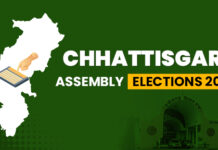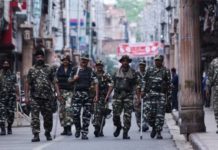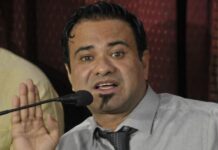
The Marxist Leninist leader Pedro Castillo is inching closer to victory in the presidential election in the Latin American Nation of Peru.
The final tally gave the leftist teacher Pedro Castillo a slim 50.17% to 49.83% advantage over his right-wing rival Fujimori, which amounts to about 60,000 votes.
Castillo is running against Keiko Fujimuri, in her third time running for president in the country. Fujimuri has accused Castillo of voter fraud, stating that around 500,000 votes are suspicious. In a press conference she stated: “There’s a clear intention to boycott the will of the people,” She then proceeded to use unverified twitter sources to back claims of Castillo’s supporters stealing votes.
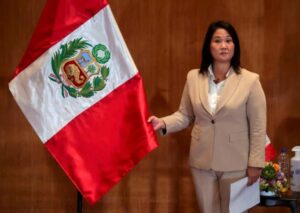
The country’s electoral authority has yet to confirm the win, and Fujimori, has refused to concede.
“We call on the Peruvian people to stay alert,” Castillo told supporters on Friday night in the middle of last-minute legal disputes over the tight vote count.
The Peru election results since Friday are still undeclared as its electoral board reviewed ballots cast in the presidential election, after a challenge to the tally by the losing candidate Keiko Fujimori.
Yesterday in a boost to Castillo, the Electoral Observation Mission of the Organization of American States said the vote was a “positive electoral process” in which “serious irregularities” were not detected.
Castillo is being congratulated from the neighbouring nations of Argentina and Bolivia.
#PedroCastillo, hermano del alma y compañero de lucha, eres orgullo de los movimientos sociales y profesionales patriotas.
¡Muchas felicidades por esta victoria, que es la victoria del pueblo peruano, pero también del pueblo latinoamericano que quiere vivir con justicia social! pic.twitter.com/QB2H4osjOu— Evo Morales Ayma (@evoespueblo) June 9, 2021
Bolivia’s former President Evo Morales, whose socialist party is in power the country congratulated Castillo on his “victory” in on Twitter, calling him a “brother of the soul and companion in struggle”. He called it not just the victory of Peruvian people but also a victory of Latin American people who want to live with social justice.
Castillo and Peru Libre
Castillo unnerved markets and mining firms when he first started to gain traction in the elections, when he won the first round vote in April. He was initially recruited by his party Peru Libre (Free Peru) as a minor candidate for these elections. In fact he was polling only 3-5 percent a month ago. However his performance in debates put him in the center of public attention. Castillo was a primary school teacher, and first rose to prominence in 2017, during a nationwide teachers strike against the then ruling government of Pedro Pablo Kuczynski.
Peru Libre is actually a lesser known party in the country, founded by Vladmir Cerron, former governor of Junin (a town in Peru). Cerron has described the party ideology as Maxist Leninist and Mariáteguist (in reference to Peruvian Marxist writer José Carlos Mariátegui). Mariategui wrote extensively on indigenous communities being inherently socialist, and the joining of regional popular movements with revolutionary Marxist theory.
Peru Libre, on their platform, supports the nationalisation of industries (especially the country’s mining sector) and resources and proposes to radically increase funding for education, and anti-corruption measures such as caps on the salary for congressional members. The party also plans to create a new constitution and cast away the one imposed by neoliberal government of Alberto Fujimori in the 1990s which privatised a number of basic social provisions.
Voter Base in Rural Peru
Castillo has been fondly dubbed by many as the candidate for “Deep Peru” referring to the rural interiors of the country. The election counting has shown that a large part of his support comes from the interiors, and southern provinces of the country especially the Andean Highlands. The population is poorer and more rural in these regions. Peru’s more wealthier parts, such as Metropolitan Lima have tended to vote for right wing and neoliberal governments over time, and have contributed heavily to Fujimuri’s vote share this time around.
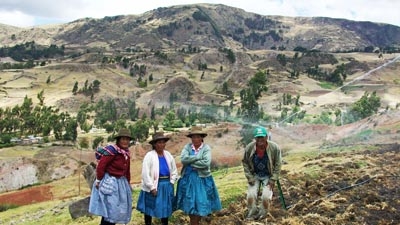
Former congresswoman and indigenous leader Tania Pariona states that: “The profits generated by our natural resources are not enjoyed by the people in the regions that produce them. The pandemic has exposed this inequality. The territories which contain the resources have been the hardest-hit because they are the poorest.” Here she highlights how the rural interiors of the country are the laces that are the more mineral rich, yet the population residing here are the poorest in the country.
Castillo’s recent rise to the Peruvian spotlight shows the discontentment of the rural populations with previous neoliberal governments and an exploitative state system. The votes are still being counted, but the party’s victory seems to be near in site.
Read: Farmworkers’ Strike Forces Peru to Repeal Agrarian Law
Fujimuri is the heir of a powerful political family in Peru. She is the daughter of ex-president Alberto Fujimuri who is currently serving time in jail for human rights abuses and corruption. Keiko Fujimuri has been public in her support for her father and defends the campaign of extra-judicial killings carried out under her father’s rule.

















